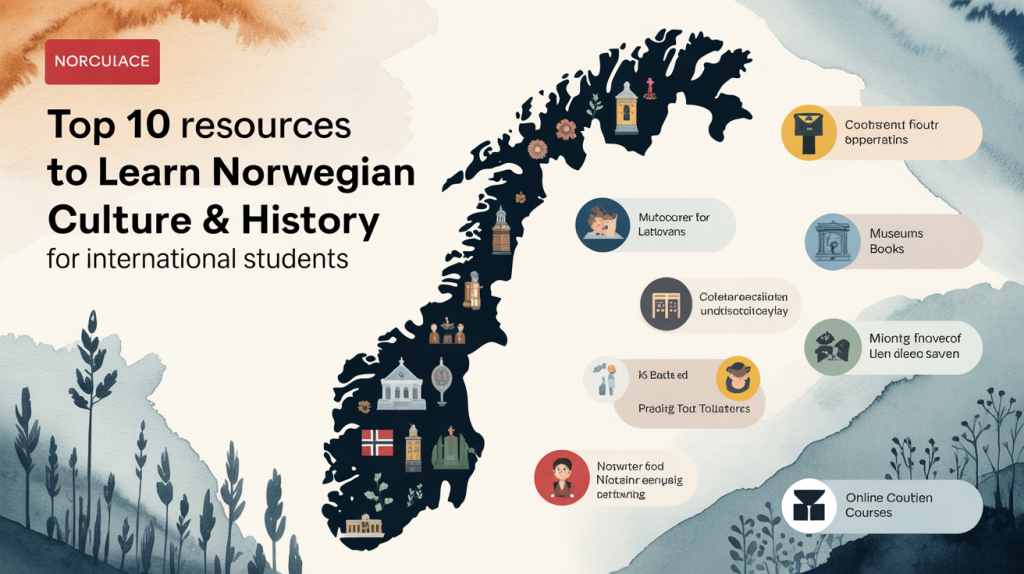Top 10 Resources for Learning About Norwegian Culture and History
- Why Understanding Norwegian Culture and History Matters
- 1. Scandinavian Area Studies: Norwegian Culture and History Course
- 2. Study Norwegian | Experience Norway – Culture / Adventure Program
- 3. Study in Norway: Language & Culture Guide
- 4. Exploring Norwegian Culture Overview
- 5. Educational Field Trips to Historic and Cultural Landmarks
- 6. Understanding Norwegian National Holidays and Traditions
- 7. Language Learning Through Cultural Immersion
- 8. Nature-Oriented Cultural Experiences
- 9. Peer and Community Engagement Opportunities
- 10. Analytical and Research Assignments on Norwegian Topics
- Conclusion: Enhancing International Study Through Cultural Literacy
- Take the Next Step with Study in Norway
Why Understanding Norwegian Culture and History Matters
For recruiters and universities, encouraging students to engage with Norway’s cultural landscape not only enriches their educational journey but also facilitates smoother integration and greater academic success. Knowledge of local traditions, societal values, and historical context enables students to navigate their environment confidently, participate actively in community life, and harness opportunities in both studies and personal growth.
1. Scandinavian Area Studies: Norwegian Culture and History Course
This academic course offers a comprehensive overview of Norwegian cultural and historical development from the Viking Age to contemporary society. Students develop skills in critical analysis, presentation, and discussion of key historical topics, enabling a deep understanding of societal dynamics in Norway.
- Key features:
- In-depth exploration of historical periods
- Analytical assignments and research projects
- Development of critical thinking relevant to Norwegian cultural studies
- Ideal for: Undergraduate students preparing for advanced studies or cultural exploration.
2. Study Norwegian | Experience Norway – Culture / Adventure Program
Bridging classroom knowledge with experiential learning, this immersive program invites students to engage directly with Norwegian culture through travel, museum visits, and active participation in traditional customs.
- Highlights include:
- Visits to Viking museums and fishing communities
- Experiencing the Northern Lights firsthand
- Hands-on activities related to Norwegian heritage
3. Study in Norway: Language & Culture Guide
This accessible guide serves as an introductory tool covering essential aspects of the Norwegian language, customs, geography, and national celebrations such as Constitution Day.
- Benefits:
- Understanding of national traditions like wearing the bunad
- Insights into local festivals, cuisine, and social etiquette
- Geography’s role in shaping cultural identity
4. Exploring Norwegian Culture Overview
Providing an overview of core Norwegian societal values—including equality, tolerance, and community engagement—this resource delves into lifestyle elements such as outdoor activities and traditional dress.
- Focus areas:
- Norwegian values and civic participation
- Importance of outdoor culture like hiking and fishing
- Traditional national celebrations
5. Educational Field Trips to Historic and Cultural Landmarks
Direct engagement with Norway’s historic sites offers students experiential learning opportunities beyond the classroom.
- Excursion highlights:
- Viking Museum at Borg
- Polar light centers and northern cultural sites
- Authentic fishing villages in Norway’s coastal regions
6. Understanding Norwegian National Holidays and Traditions
A deep understanding of public holidays—especially Constitution Day on May 17th—is essential for appreciating Norway’s collective identity.
- Highlights include:
- The significance of Constitution Day and its celebrations
- Traditional foods and communal activities
- Role of cultural symbols like the bunad
7. Language Learning Through Cultural Immersion
Combining Norwegian language acquisition with cultural experiences enhances social integration and comprehension of local nuances.
- Approaches:
- Language courses integrated with cultural excursions
- Engagements that foster practical conversational skills
- Understanding regional dialects and cultural expressions
8. Nature-Oriented Cultural Experiences
Norway’s natural environment plays a crucial role in its cultural identity. Engagements in outdoor activities educate students on the interplay between geography and tradition.
- Experiences include:
- Hiking Norwegian fjords and mountains
- Dog sledding and fishing excursions
- Boat trips along coastlines revealing historical trading routes
9. Peer and Community Engagement Opportunities
Building community connections through student organizations and civic engagement initiatives promotes cultural exchange and belonging.
- Opportunities:
- Joining local clubs and student unions
- Participation in community events and volunteer work
- Group projects fostering intercultural dialogue
10. Analytical and Research Assignments on Norwegian Topics
Encouraging students to undertake research projects or papers centered on Norwegian history and culture hones critical thinking and deepens understanding.
- Benefits:
- Development of academic writing and research skills
- Personal interpretation of historical and cultural themes
- Preparation for advanced studies or professional fields
Take the Next Step with Study in Norway
Ready to elevate your international recruitment strategies and support students with exceptional cultural and educational experiences in Norway?
Conclusion: Enhancing International Study Through Cultural Literacy
Understanding Norwegian culture and history is indispensable for international students’ success and integration. The top 10 resources for learning about Norwegian culture and history outlined in this post provide a multi-faceted approach, combining academic rigor, experiential learning, and community involvement.
By leveraging these resources, international recruitment teams, university admissions, HR professionals, and student placement agencies can better prepare students for the unique opportunities that Norway offers, fostering academic excellence alongside cultural competence.

